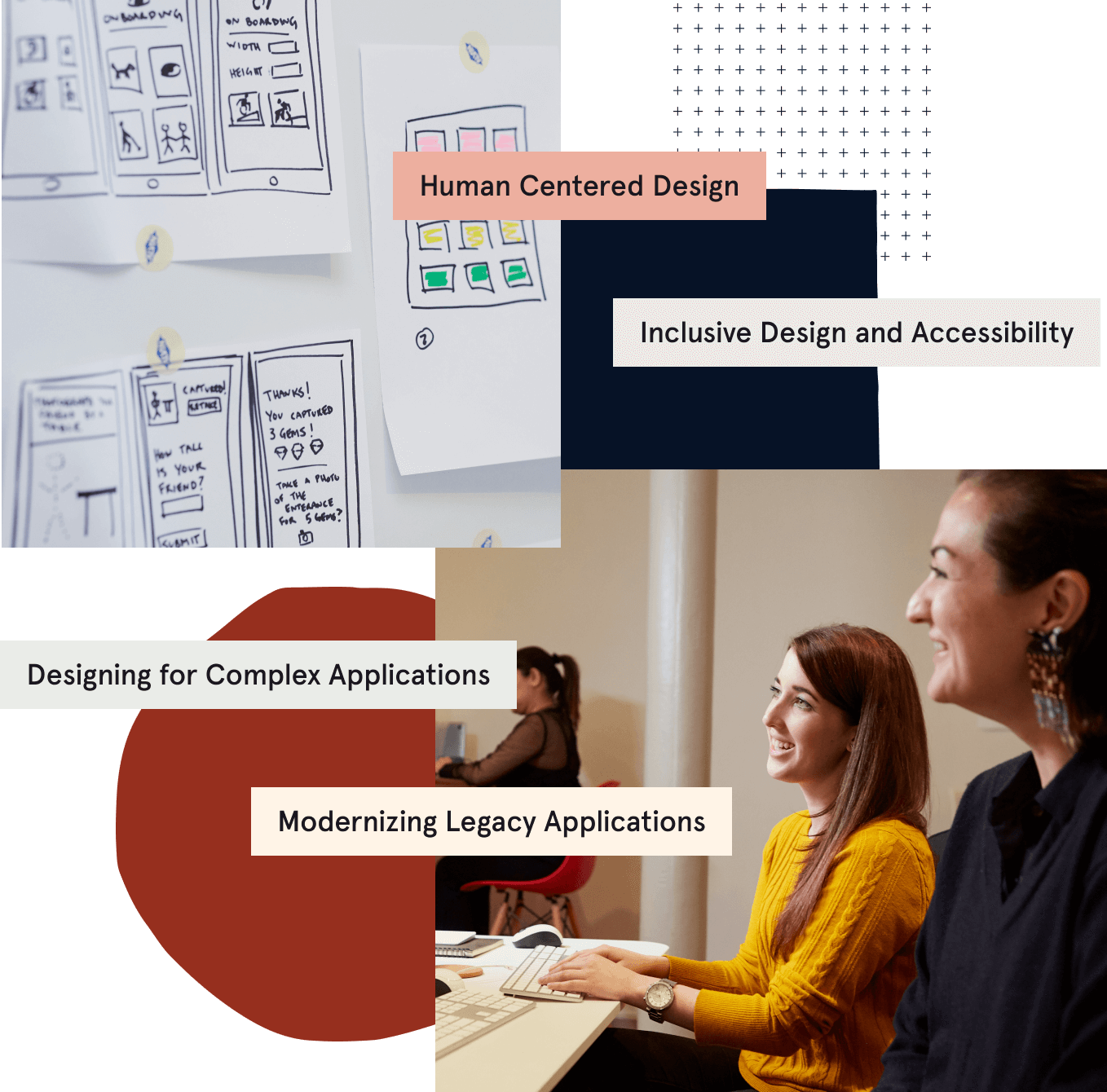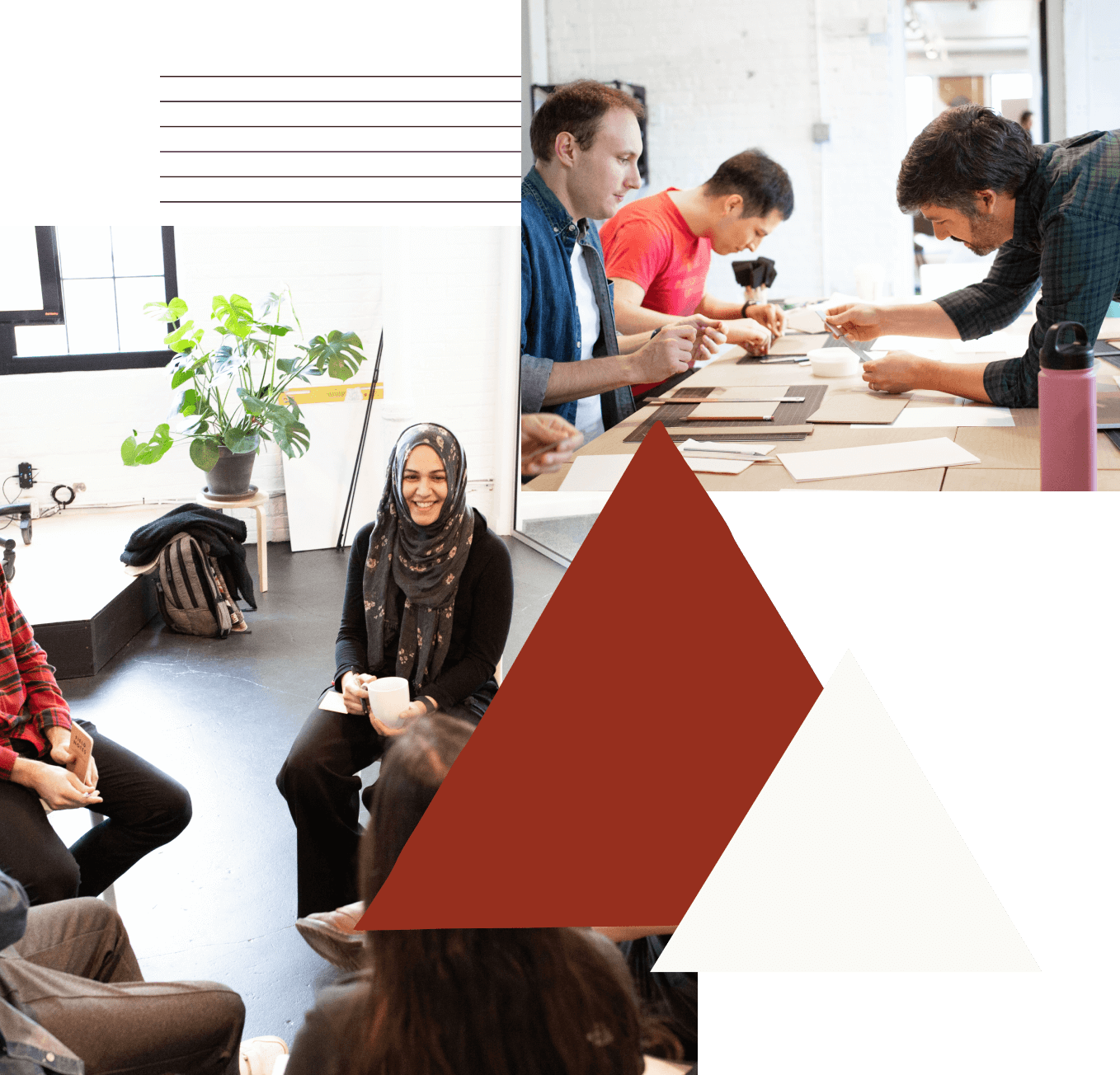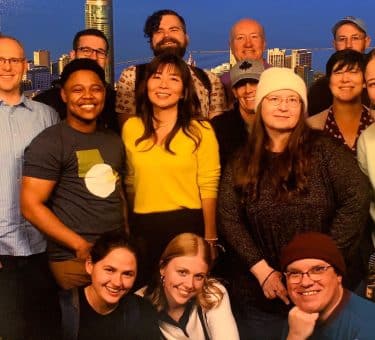Happy Pride! In today’s roundtable, four of Tandem’s LGBTQ+ team members sat down to talk about their experiences in the tech industry and at Tandem.
Do you think the tech industry is a good place for LGBTQ+ people?
Jess: I’ve worked in several different fields, and academia and law are very different from tech. Academia is an incredibly conservative field; it’s a place where your seniority is discretionary. So, it is extremely difficult to be different in any way. Law was conservative in another way. For me, the tradeoff between being myself and advancing myself wasn’t worth it.
One of the things that is good about tech is that tech workplaces have a reputation for having a more relaxed attitude toward traditional professional norms — it’s okay to be socially awkward and less polished, which provides a lot more space for gender nonconformity. In tech, I don’t have to participate in a strict idea of “professionalism” that’s actually a vehicle for sexism and homophobia.
Chris T: I come from an art background, and art school was very open-minded toward people who are queer. I definitely noticed a shift when I moved from that environment into the FinTech industry, which is what I did before I was at Tandem. I felt like I had to change how I behaved and acted, and do a lot of self-editing to fit in. In my previous jobs I definitely didn’t feel as comfortable with myself. So I’d say it depends on the specific industry within the tech field, and the specific company you work for.
Kate: I’m a pretty straight-passing individual. I think my struggles in tech have had more to do with not being taken seriously as a woman, and not because of my queer identity. Being in a hetero marriage is interesting because I fit in a lot of places that other queer folks don’t have access to. But then I also sometimes get my identity denied by people.
I agree with what Jess said about how tech’s casual environment can feel welcoming because you don’t have to be conservative or cis-passing or meet other peoples’ expectations of what you look like. But I do think that even for a field that feels very open to people who are different, there can be surprising times when you can still experience invalidation.
I do think the lower barrier of entry into tech, and the fact that technology has infiltrated every industry, means that more folks who are denied traditional career opportunities are able to thrive in tech. So by osmosis, I think we’re shifting the tech industry faster than other fields. I think there are more pros than cons to working in technology, but I don’t think all our inclusivity problems have been solved.
Jess: I agree. In a sense it can almost be a little bit more scary to have that freedom. If you’re working in a conservative field where you know that you’re not going to be accepted, at least you know what the rules are. In tech, you have to figure out for yourself what is okay and how honest you can be about your identity.
Kate: That’s a really good point about not knowing the rules, because you feel like you can be a little more open since tech is uniquely situated to overstep the boundaries between home and work. That impacts LGBTQ+ folks because they’re more likely to be taking care of their families and experiencing the economic factors that intersect with that. Tech already has a problem with boundaries, and on top of that there’s a culture of “we’re a family” when the work culture is more casual. The line between what is professional and what is personal blurs.
Caleb: When I think about the tech industry, my brain goes to a different place. I think about the software that we make, and how as more queer people are working in tech, we’re thinking about our implementation of software in more inclusive ways. For example, should a field for pronouns be included in a form? Should we have this drop-down menu provide sexuality options beyond just ‘straight’ or ‘gay’? Being trans, my legal name is different from my name that I share with everyone. So in so many places I end up being referred to by my legal name, and that is ultimately a technology problem. We can be the voices that say “hey, let’s have the display name in this software be different from the user’s legal name.”
When you are job-searching, what initial signs make you feel comfortable applying to or interviewing with a company?
Caleb: The way the application is worded tells me a lot. Do they ask me for pronouns? Do they mention their values in the application? When I applied to Tandem, I read through all of Tandem’s values and the blog posts on the website.
Some things that signal to me that a company is not a place where I’d like to work are more buzzword-type things. If the job post says “we are an intense company” or gives the impression that all they do is work, it gives me the impression that they’re not going to value me as a person. I’m a human first before I’m a worker.
Kate: There’s a factor of intersectionality that I look for. I got burned pretty badly in the past by a company that did ask for pronouns on job applications, but didn’t have a wheelchair-accessible building for the engineering department. I’ve had lots of conversations with other women in tech about microaggressions that can sometimes show up even in early interview stages.
Other factors I consider when looking for a job is if there is something on their application or in their process that I have feedback about, what is their response? Are they defensive? Finding out how they take feedback is really important.
Jess: I think one thing that can be really difficult about the corporate approach to diversity is that sometimes it takes this “acquisitional” tone. One thing that I think is difficult for companies to understand, even well-intentioned companies, is that lack of diversity is never the problem: it’s a symptom of the problem. There’s never just an accidental lack of people from different marginalized groups, and if that is the case at a company or within a field, it is likely because of hostility or discrimination on some level or many levels.
I’ve encountered a lot of companies where they try to solve this problem by just hiring more diverse people, but that’s like trying to fix a wood chipper by adding more bunnies. The problem isn’t the low rate of bunny retention, the problem is the essential nature of the wood chipper! You have to change the machinery before you can expect the bunnies to survive the process, let alone thrive.
So, what I look for in general in a company, is a process that actually achieves inclusivity goals in the short and mid and long terms, with specific goals and plans. That’s what carries the performance of inclusivity to actual inclusivity.
Chris T: Jess just made a really good point about inclusion versus diversity, and in my mind those are two very different things. When a company loudly celebrates their diversity it sometimes feels like a box checked, rather than it actually being for the sake of the people they’re including. That’s something I look out for when applying for jobs. I look at the language and tone of the website: is it a welcoming and encouraging environment for learning and growth? It’s something you can glean from the way they speak about themselves.
Kate: You shouldn’t be trying to build a culture that is “inclusive to LGBTQ folks.” You should be trying to build a culture of empathy. LGBTQ folks have spent a lot of our lives trying to identify our self-worth in a system that doesn’t think we have it, and corporate culture has taught conforming people that that’s where we should get our self-worth from. As more of us get into the technology industry, the less willing we become to put up with non-empathetic workplaces — because we’ve spent so much time recognizing that we have to find safe, empathetic places for survival.
When you do diversity to check a box, it’s so obvious because the lack of empathy is visible throughout your organization. If you don’t treat your cis folks like whole human beings, I sure doubt that you’re going to treat your trans folks like whole human beings. We need to get to a place where the industry has empathy for humans, and I think we are going to get there faster than a lot of other industries.
Jess There’s a saying in disability activism: “nothing about us without us.” You can’t just be a company that creates a plan that serves trans people if trans people aren’t part of the creation of that plan. A red flag for me is that kind of cartoonish approach to diversity. It’s great that you have pride flag icons on your website, but will my manager be able to have hard conversations if I bring up that I’m constantly getting misgendered by a particular co-worker? There’s a rainbows and sunshine approach to diversity that can sometimes prioritize avoiding difficult feelings, rather than actually fixing problems.
What has been your experience of the environment at Tandem, especially as it relates to your LGBTQ+ identity?
Kate: Honestly, my identity hasn’t even been a ‘thing’ here, which is a really good thing for me. I’m able to have conversations like everyone is my friend who already knows me. I don’t feel icky, I never feel like I’m over-sharing when something about my identity comes up in conversation. It’s never been an issue, which is kind of refreshing.
Chris T: Agree with Kate. I’ve never felt uncomfortable at Tandem regarding my identity, which is a bit surprising, especially with the industries I was in before, where just mentioning my husband in passing was often met with confused or disapproving looks. I honestly wasn’t sure I’d ever find a company that is as genuinely welcoming as Tandem has been, and definitely glad I have.
Caleb: I came into Tandem pretty guarded, which is a result of living in society as a black, queer, trans person. I was really protective of my name, my pronouns, my medical transition. I had hard boundaries and didn’t want anyone asking weird questions, like I’ve gotten at previous workplaces.
But over time, I now feel open to just be me. Dominic and I will talk about cars, and I know it’s a pretty stereotypical gender thing for men to like cars, but I just happen to be a masculine person who likes cars. Chatting with Dominic about cars is never condescending or weird. He never questions, “Um, why are you into this topic?” It’s just having a conversation about an aligned interest.
So, initially I was super guarded, but I’ve been slowly opening up and am able to just talk to people like friends.
Jess: That’s also been difficult for me. I’ve had some experiences with direct homophobia. I’ve gotten fired for being clearly gay, and it sucks. A lot of the time, with homophobia, transphobia, or sexism, the person I’m interacting with isn’t really even aware of what they’re doing. Sometimes I feel this internal pressure to act “more straight” but that feels super uncomfortable and makes me feel resentful and frustrated and awful. This is why I changed careers.
It has been a process for me at Tandem, just relaxing a little bit and feeling more comfortable being myself. I’ve had overall really good experiences here. Everybody’s supportive, and supportive in a chill, genuine way — not a weird, performative way.
Caleb: I want to touch on the onboarding process. Names really matter, so coming to work here I was able to go through the entire process with my name, Caleb, and not my legal name except for the tax parts that needed it. And at the very beginning, I noticed that our expense reports system was displaying my legal name. I brought it up to my manager, and her response was just to immediately take care of it. I’ve been in other situations, like at school, where people acted like it was impossible to change a name in a system, even though it clearly isn’t that hard. From that point, and also our first round-table talk about the apprenticeship, I got clear flags that told me Tandem is a place where I can be open and feel safe and validated in my gender expression.
Jess: During the interview process, I did my technical interviews and then met with Mercedes, and we had a great long talk. We were talking about the interview process, and I brought up some feedback I had about the way pronouns were asked for on the application. And Mercedes was grateful for the feedback and we had a really thoughtful conversation about gender. When I hung up, I thought, “Why did I do that??” because as a job candidate, you’re never supposed to bring up criticism or negative stuff! But they ended up hiring me and really demonstrating that even a job candidate can bring up a potential problem, and the leadership will take it seriously and won’t penalize you for giving that feedback.
Kate: As a member of the leadership team, I’ve worked a lot on our engineering hiring rubrics. I feel really strongly about rubrics as a way of actually assessing what we need to assess with applicants, and not relying on subjective feelings that can introduce bias. We want to make sure candidates are supported along the way, and that if anyone ever asks why they didn’t get a job offer, we’re able to point you to specific skills on our rubric.
I think Tandem has done a really exceptional job of letting the Leadership Team drive these initiatives that are important to us and that come from suggestions within the company. That helps build this empathy that is at the core of building a safe place for people to work. You should feel safe coming to work here. I have been at multiple companies where I’ve tried to push these kinds of initiatives and get leadership buy-in, and it’s been a nightmare everywhere except here. Having the opposite experience at Tandem has been good for me.
Learn more about Tandem’s core values.









